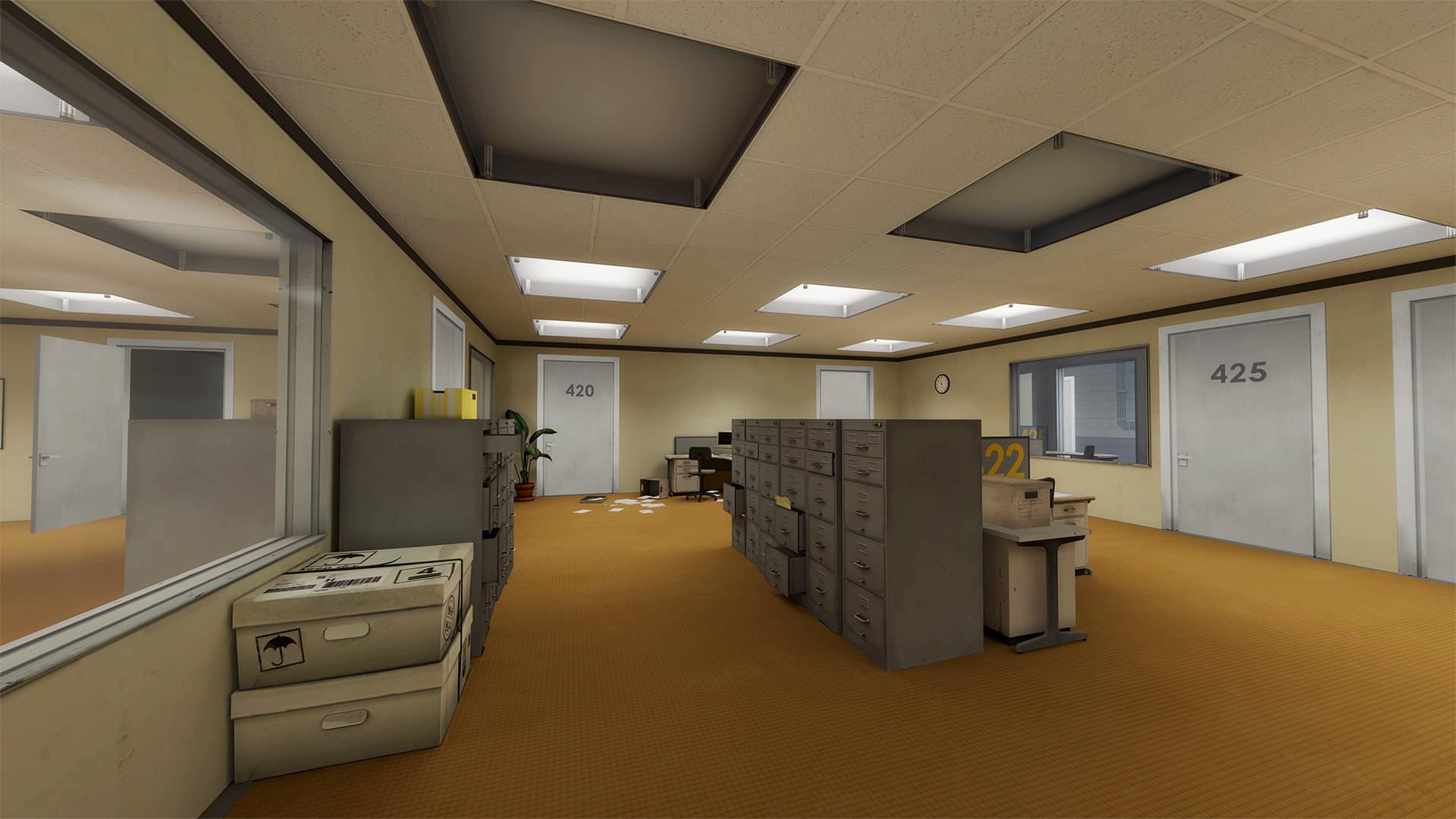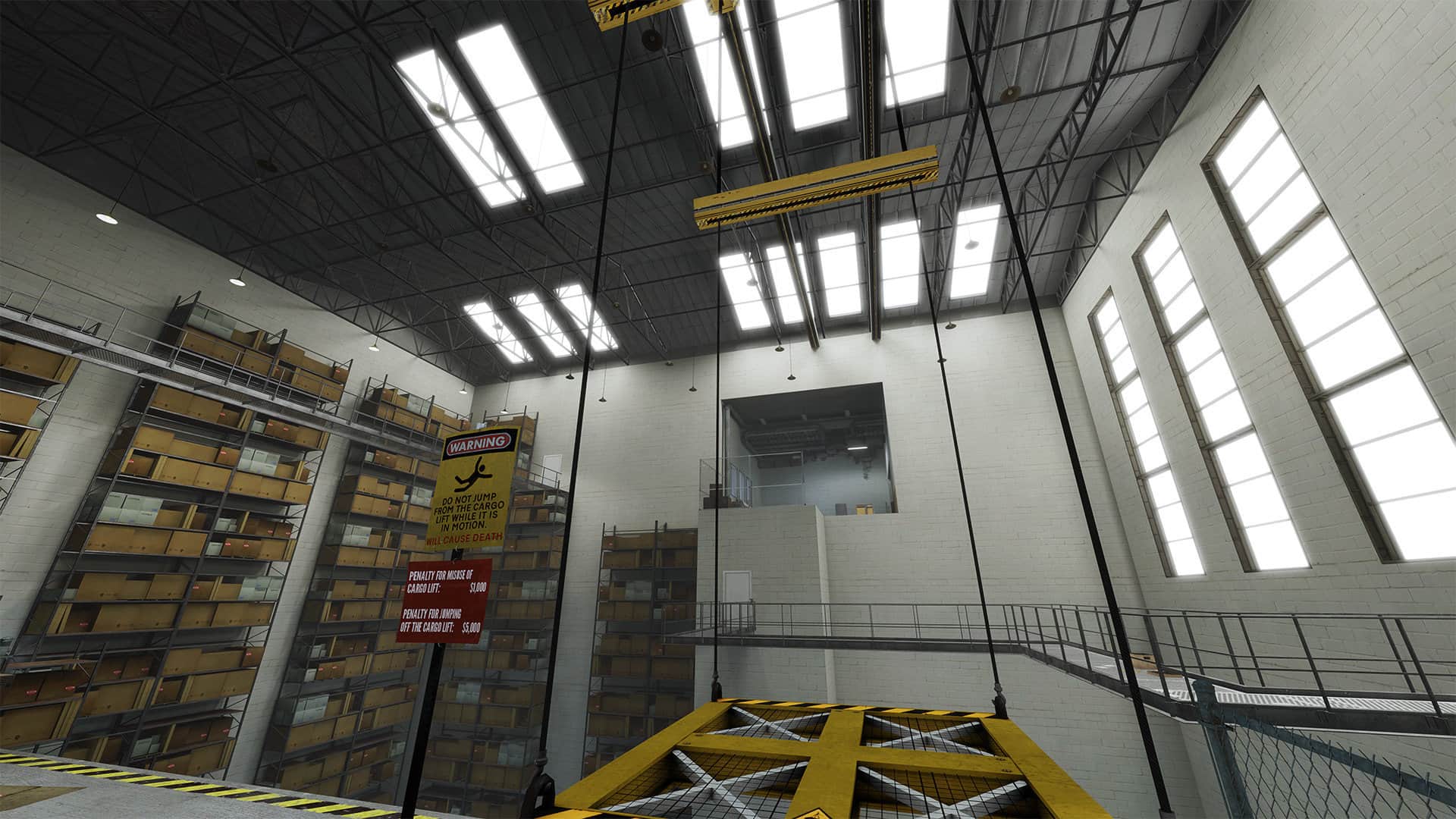You can trust VideoGamer. Our team of gaming experts spend hours testing and reviewing the latest games, to ensure you're reading the most comprehensive guide possible. Rest assured, all imagery and advice is unique and original. Check out how we test and review games here
The Stanley Parable tells the story of Stanley, a man who works in an office. Commands come through on his computer monitor, telling him what buttons to push, and he pushes them. One day, no commands come through, and Stanley isn’t sure what to do. This curious adventure was originally developed, by Davey Wreden, as a mod for Half-Life 2. This was an excellent joke in itself, given that the hero of that game, Gordon Freeman, is always sure what to do. He is the anti-Stanley. Not only does he trounce an alien menace; he possesses a Zero Point Energy Field Manipulator, better known as a Gravity Gun, which allows him to thumb his nose at Newton, stilling objects in a dreamy stasis and zipping them to and fro. In other words, the rules don’t quite apply to Gordon; he pushes whichever buttons he likes, and the world bends to accommodate him.
But Stanley had the last laugh. The crux of his game (which is so reflexive that it resembles a set of Russian dolls) was that no such bending really exists, that accommodations were, in fact, made for his and Gordon’s every action—not by a quirk of fiction but by the developers, who sit and dream and drum on their keyboards. Not unlike Stanley. Indeed, there is a palpable air of hopelessness to Wreden’s existential jeu d’esprit. His hero may stand in the textured ether of a simulated world, but he has no affect; he—and, by extension, we—can do nothing that has not been pre-coded for us. We are told what buttons to push, and we push them. So, why bother being an energy field manipulator, when there is zero point?
This question was put to us a second time in 2013. Wreden reworked The Stanley Parable, in partnership with William Pugh, and the story was not only interpolated with extras but reupholstered. It remained in the Source engine, but it bore the bland sheen of the corporate arena: dead art, beige and boxy computers, coffee cups professing their hatred for Mondays—all those things that laminate and lock the spirit. (The lifts, however, were a tell: clattering cages that scraped over brick, imported straight from City 17.) Now we have The Stanley Parable: Ultra Deluxe, for which Wreden and Pugh have devised even more content; at one point we are met with a menu screen for The Stanley Parable 2, though it is meant as a teasing joke. The game has been ported into Unity—another nice irony, since you are unlikely to play anything as self-fracturing or divided—and, along with its PC release, it arrives, for the first time, on consoles.
Our goal is as it always was: to guide Stanley, in first person, through the infernal hallways of his office, toward something resembling a conclusion. On the way, of course, the very concept of a goal will liquesce into a meaningless soup. Our actions are commented on by a narrator, voiced by Kevan Brighting. “When Stanley came to a set of two open doors, he entered the door on his left,” he says, naturally nudging those of us with a rebellious streak into taking a right. “This was not the correct way to the meeting room, and Stanley knew it perfectly well.” This wry device is still a good one. It brings to mind the movie Stranger Than Fiction, in which the voice of a novelist, played by Emma Thompson, is brought to the mind of Will Ferrell, narrating his days and driving him mad. “It’s telling me what I’ve already done,” he explains to a psychologist, adding, “accurately and with a better vocabulary.” Brighting, in his avuncular tones, makes for good company—swerving from kindliness into alarm and irritability—though, if my days were to be metred out by an authorial deity, I would take Thompson.
The echo, in this setup, is of GLaDOS, the artificial intelligence who presided over Portal—a major influence on Wreden. She, too, offered her thoughts on our progress, chivvying and chiding us as we explored the bowels of a scientific research facility. And how much you relish The Stanley Parable: Ultra Deluxe will, I suspect, depend on how you view it in relation to that work. Does it take the player-versus-machine premise to its logical extreme, laying it bare as an illogical relationship of need, or does it overlook that game’s mechanical message—that boring holes in the very fabric of video game conceit is fine, so long as it isn’t boring?
There were times, I have to confess, where my thoughts drifted from Stanley’s quest. Not that it isn’t a compelling place to be. Having just watched Severance—in which Adam Scott, pursed with concern, lives a half-life in a bureaucratic maze—I thrilled to the interiors. We get cubicles with bright-yellow block numbering, electric pencil sharpeners, and rotary telephones in arresting hues. And there is much else here to amuse and divert—not least the portals that open into other, familiar game worlds. But I can’t shake the restlessness that descends on me while I play, nor the feeling that cleverness is always better off as subtext, rather than text. Our narrator is certainly a warmer companion than GLaDOS, but, in his long and intricately written musings, his intelligence feels equally artificial. The Stanley Parable: Ultra Deluxe ought to be played; I can think of no other game that frets quite so rigorously on the nature of its medium. Personally, more than anything it made me want to play Portal again, and I kept thinking that Wreden, for all his inventiveness, is telling us what that game has already done—accurately and with a better vocabulary.
The Stanley Parable
- Platform(s): Linux, macOS, Nintendo Switch, PC, PlayStation 4, Xbox One
- Genre(s): Adventure, Indie




